Progress Report by Region
As of 22.11 Release
Tamriel Rebuilt develops its content as a series of expansions that add new pieces of the Morrowind mainland to the game world. These expansions will typically center around a region – areas with distinct asset design and usage – although often the expansions will also contain parts of several other regions. Maps showing our planned regions as well as present and planned expansions are shown below:
On this page, we walk through Morrowind’s mainland region-by-region, according to their state of completion. Completed expansions are included in our released mod (specifically the plugin file TR_Mainland.esm); expansions that are still being developed can be previewed in our separate section files.
Telvannis District
The Telvannis District encompasses the dangerous and isolationist northeastern part of Morrowind, home to the ruthless Telvanni wizard lords. This was among the first parts of TR to be developed, released as the Telvannis and Antediluvian Secrets expansions in 2006 and 2008, respectively. In 2022, the western seaboard of the Telvanni peninsula was also the first of our old, released areas to be overhauled in the Embers of Empire expansion. In the distant future, we plan to fully overhaul the entire peninsula with unique assets to make it truly fitting as the realm of the mad wizards.
Sea of Ghosts

The island of Althoa in the Sea of Ghosts.
Stage: Partially released in Embers of Empire (2022).
Description: The frigid Sea of Ghosts to the north of Morrowind, known for its dangerous storms and pirate covens, is nevertheless an active shipping lane plied by Nord merchants. Its isolated crags and islands most resemble Sheogorath in look, but the weather is much harsher with occasional blizzards. Among the few isles north of Morrowind, the most prominent is Althoa, home to the run-down Imperial Navy outpost of Nivalis, a Telvanni tower, and a Velothi village.
More islands in the Sea of Ghosts region, such as the semi-mythical Vounoura and several Reaver isles to the north of the Velothis district, will be released later.
Dagon Urul

Mount Sarrunabi overlooking the city of Firewatch and the Dagon Urul coast. Vvardenfell in the background.
Stage: Released in Embers of Empire (2022), pending overhaul.
Description: Dagon Urul is a dangerous and barren wasteland on the western coast of the Telvanni peninsula, dotted by Daedric and Dwemer ruins and crumbling tombs. Largely neglected by the Telvanni, this is where the Empire built its district capital of Firewatch and the trade town of Helnim. Outside of the city walls, inhabitants include only an occasional Imperial mine, the poorest of Velothi ranchers, and the most isolationist of Telvanni wizards.
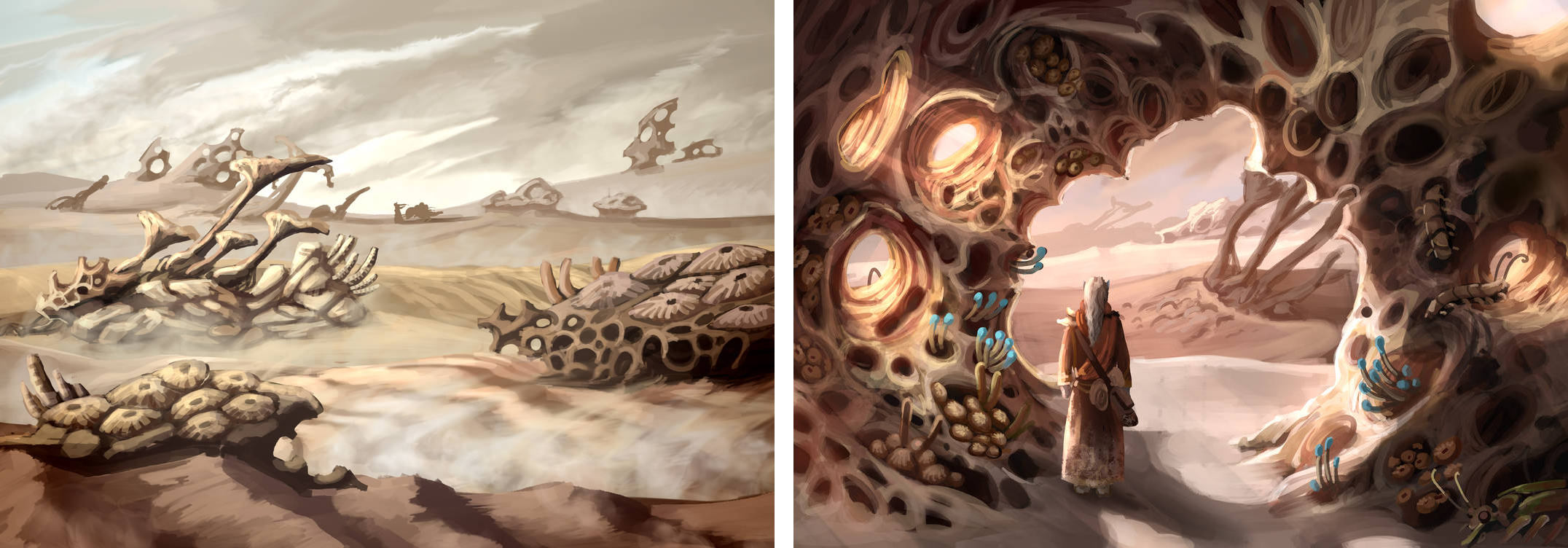
Feivelyn’s concepts for a final Dagon Urul.
The Dagon Urul region was built in 2021-2022 as a medium-term replacement for a very old landscape of Molaghread and Boethiath’s Spine, first released in 2006’s Telvannis and 2008’s Antediluvian Secrets. Largely mirroring Azura’s Coast on Vvardenfell, the current look of the Dagon Urul wilderness will eventually give way to a haunted ashland, come the full Telvannis redo.
Sunad Mora

Marshmerrows growing along the banks of a shallow creek.
Stage: Released in Telvannis (2006), pending overhaul.
Description: Sunad Mora is a series of fertile plains on the northeastern tip of the Telvanni peninsula, separated from Dagon Urul by the jagged ranges of Boethiah’s Spine. Outside of the many ranges that cross-cut it, the region is generally flat with sparse but consistent tree cover. This region contains the prominent Telvanni towers of Tel Ouada and Llothanis.

Feivelyn’s concepts for a new Sunad Mora.
Currently a mix of Grazelands and West Gash assets, we intend to eventually replace this area with hostile, sulphurous ashlands towards the center of the peninsula and a cursed mushroom forest towards the west.
Boethiah’s Spine

A rocky valley in Boethiah’s Spine, looking towards southern lands.
Stage: Released in Telvannis (2006) and Antediluvian Secrets (2008), pending overhaul.
Description: The treacherous ridges and deep valleys of Boethiah’s Spine stretch north-to-south through the heart of the Mainland’s eastern peninsula. The southern portion of this region is dominated by the deep Lake Boethiah, whose surrounding towns and settlements include the towers of Tel Mothrivra and Alt Bosara. In the north, the Spine separates into several ridges which gouge their way through the otherwise flat plains of Sunad Mora. This region is largely rocky and barren, but its steep cliffs conceal several lushly forested valleys.

Feivelyn’s concepts for an overhauled Boethiah’s Spine.
Post-overhaul, Boethiath’s Spine will be raised significantly to turn it into a true mountain range and will be remade as ashy and volcanic. Home to the ash-mad Dust Adepts, this will become one of the most dangerous regions in Morrowind. The southeastern part of the current region will instead become Scath Anud, a rocky and forested region on the Padomaic shore, known for its picturesque waterfalls and rivers.

Feivelyn’s concepts for an overhauled Scath Anud.
Telvanni Isles

The north shore of Vahn, looking towards western lands.
Stage: Released in Telvannis (2006), pending overhaul.
Description: The scattered islands of this archipelago, with their uninviting terrain of barren hills and damp fungal groves, seem inhospitable at first glance. Yet, the Isles serve as the isolated heartland of the reclusive Great House Telvanni. The twisted sprawl of Port Telvannis serves as the House’s capital, and several other towns and plantations populate the surrounding islands.
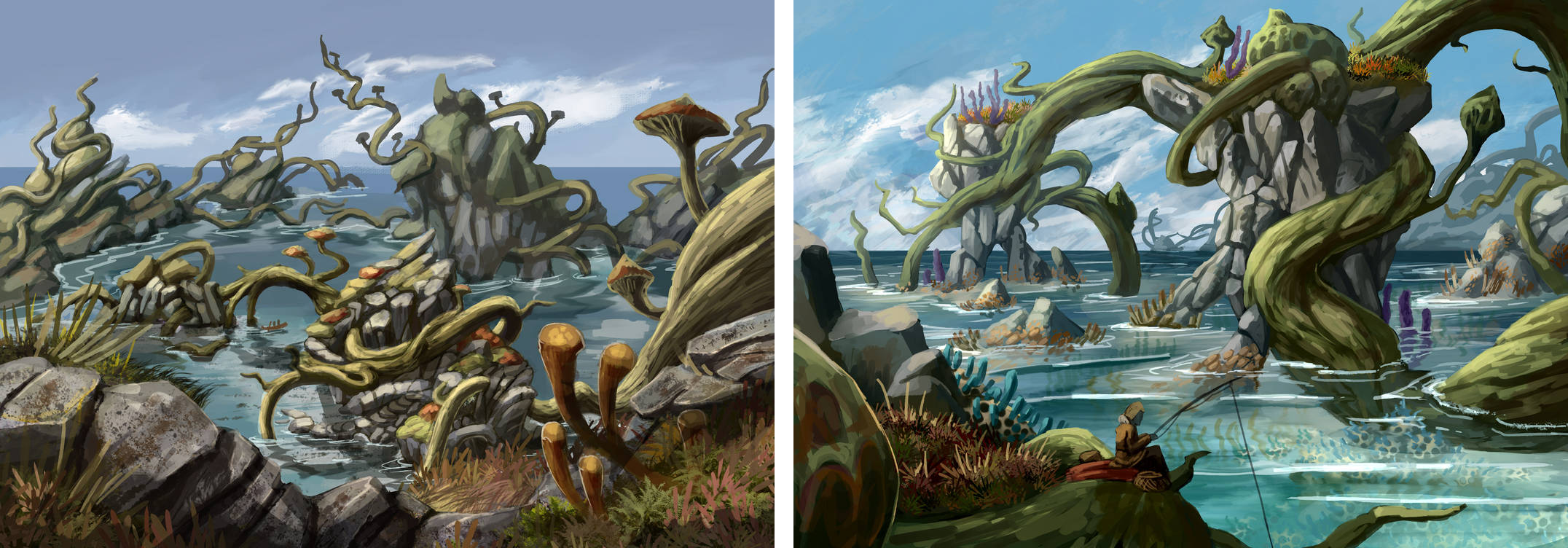
Feivelyn’s concepts for overhauled Telvanni Isles.
The post-overhaul vision for the Telvanni Isles will iterate on the current look of the region, adding Sadrith mushrooms galore, plenty of sea life and coral, and magical dangers throughout the wilderness, as well as innumerable inhabited and abandoned Telvanni towers sprinkled all around.
Molag Ruhn
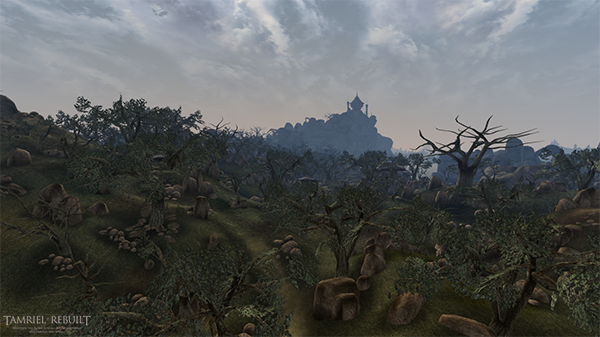
Looking west across the fields of Molag Ruhn.
Stage: Released in Antediluvian Secrets (2008), pending overhaul.
Description: Notable for its guar herds and the Dwemer ruins of Kemel-Ze, Molag Ruhn is the southernmost of House Telvanni’s holdings. The region features the Telvanni towers of Tel Muthada, Marog, and Tel Gilan, the last of which has strong trading ties to the Imperials in Helnim.

Feivelyn’s concepts for an overhauled Molag Ruhn.
Post-overhaul, Molag Ruhn will be expanded to form the bug-herding heartland of the Telvanni. It will consist of grasslands and rocky hills dotted with Parasols, Corkbulb, and Hackle-Lo trees – a region inspired by the Pocket Guide to the Empire, 1st edition.
Mournhold District
The Mournhold District stretching from Telvannis to the Deshaan plains, and from the Thirr river to the Padomaic ocean, forms Morrowind’s heartland and is the citadel of House Indoril. Released for the most part in the 2012 expansion Sacred East, this district, too, is in line for a major overhaul, part of which is already ongoing.
Mephalan Vales
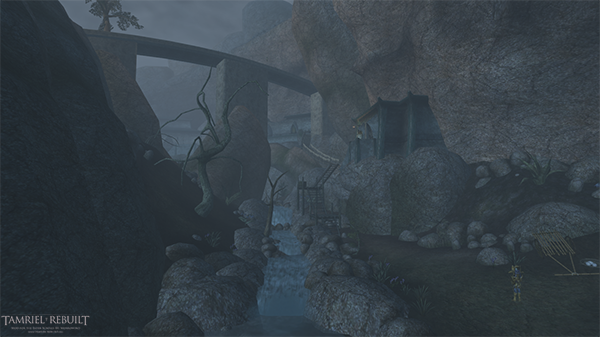
The Vales are perennially foggy.
Stage: Released in Sacred East (2012), pending overhaul.
Description: The Mephalan Vales are a complex maze of canyons often wreathed with fog, which even the high ideals of the Tribunal have failed to fully penetrate. The local Indoril rulers lack a unified vision and feud with each other, while ancient forces continue to spin their plots unseen. This treacherous terrain of the Vales forms a natural northern border to the territories of House Indoril. Winding paths connect the fortresses of Ammar and Akamora, while ghosts, outlaws and worse dwell in hidden valleys and in the ruins of Dun Akafell.

Gnomey’s exploratory sketch for a Mephalan Vales overhaul.
Our plans for a re-imagining of the region will largely build on the current vision: maze-like cliffs hiding foggy, enchanted forests strewn with spider webs, but with a purple hue and better asset use leveraging purpose-built environmental models.
Sacred Lands

All roads lead to Necrom.
Stage: Released in Sacred East (2012), pending overhaul.
Description: The Sacred Lands is a rugged coast where rocky ridges surround the sparsely vegetated land that hosts the Dunmer holy city of Necrom. The hallowed and haunted lands around the City of the Dead appear dour and cold, but are alive with the whispers of Dunmer dead carried by the wind, and with the spirits themselves. This is not a place for outlanders, whom the ancestors despise. Necrom’s white architecture contrasts starkly to the browns and greens of the surrounding area. The region also contains the Indoril town of Sailen and the tiny hamlet of Evos, and adventurous travelers may find the occasional tomb, ruin and Daedric shrine to explore.
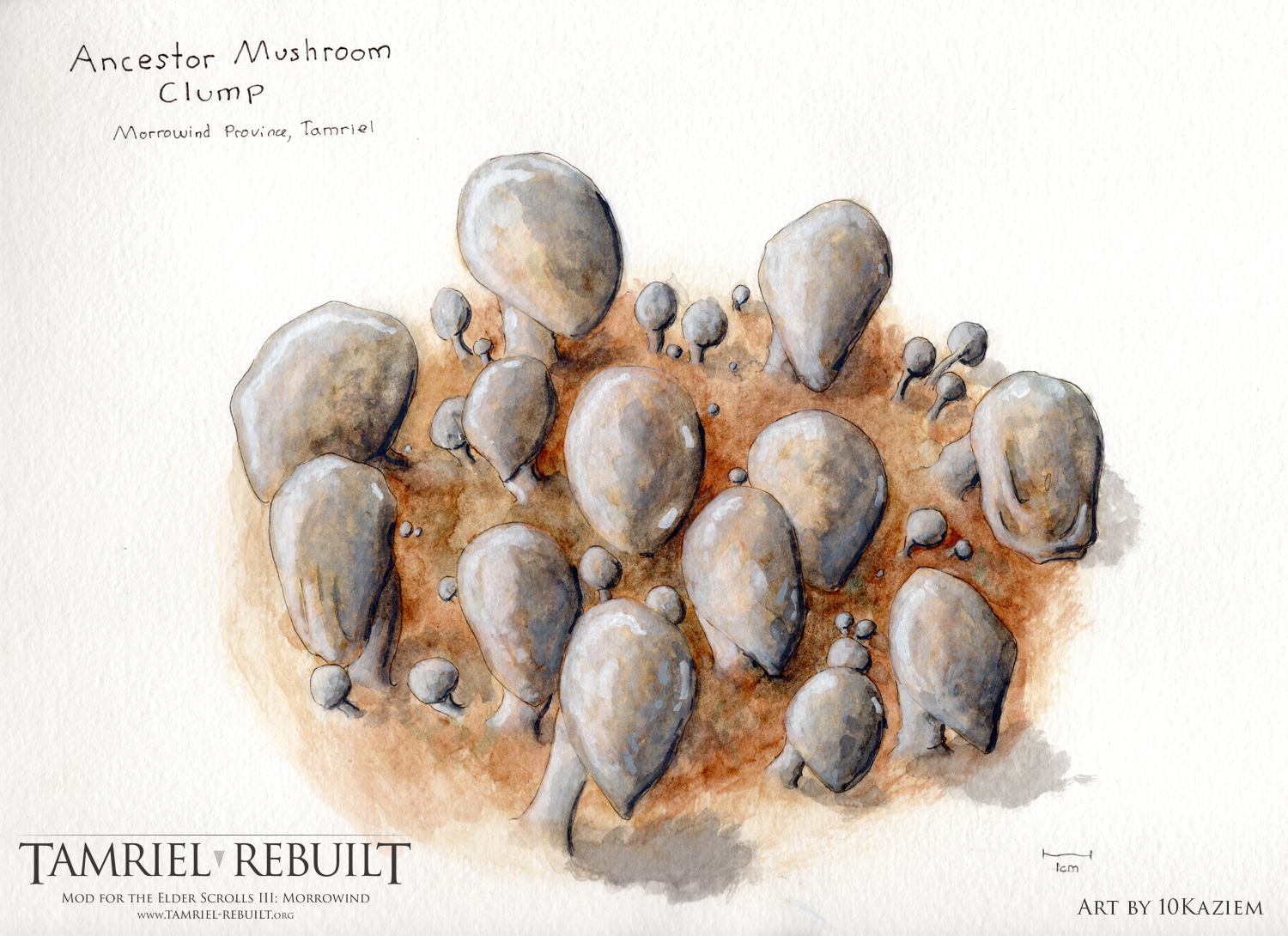
10Kaziem’s concept for fungi in the Sacred Lands.
Instead of West Gash version 3.0, the post-overhaul Sacred Lands will become the northern part of the great eastern Morrowind mudflats (as intended by Bethesda in their late-1990s Morrowind concept map), wreathed in fog and covered in ghastly mushrooms of various kinds. Necrom, too, will likely get a much-improved architectural set and a new city plan, although it will largely retain its current, iconic look.
Nedothril

Netch roam this coastal region.
Stage: Released in Sacred East (2012), pending overhaul.
Description: The forests that once spanned the Nedothril Coast have long been cleared to make way for Indoril industry. Various fields and towns dot the region, and ships travelling the Padomaic Ocean sail along its shores. The populace is industrious but inwardly focused, and though their goods are transported far and wide, outside influences have had little impact on them. The hamlet called Seitur and the small port of Enamor Dayn are located along the coast and the latter offers a ferry service to the island and town of Gorne.

Gnomey’s sketch of Mervayan.
Although there are few concrete plans yet for a post-redo Nedothril, there is general agreement that the area needs a full aesthetic overhaul. The region will likely be widened to the west and south and form the heavily-cultivated middle part of the eastern Morrowind muflats. Nedothril will also include the second-largest Indoril-controlled city, Mervayan, on the mouth of the Orethan river. Built in the Velothi style, this will be a point of departure for Indoril export goods and one of the major trade ports on Morrowind’s east coast.
Lan Orethan
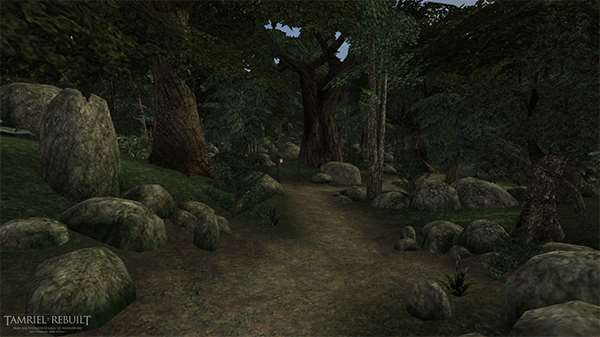
Trees in Lan Orethan can cluster so densely that they block out the sun.
Stage: Released in Sacred East (2012), pending overhaul.
Description: While to the east and west the Indoril cut down forests to provide space for Morrowind’s economy to grow, in Lan Orethan the ash-ravaged woods were not only kept, but revived and flourished with more life than before; a vast garden for the Dunmer, to provide them with a glimpse of utopia to follow. The Indoril there were themselves enraptured by their creation, but surrounded by their success, are thought by many to have lost sight of the wellbeing of Morrowind as a whole, focused only on tending to their immediate surroundings. This forested region straddles the lower Orethan river and contains the Indoril villages of Bosmora and Dreynim Spa, as well as manors of many important Indoril families.

Planned Amber Forest area on the TR gridmap.
Although Lan Orethan is certainly one of the loveliest of old TR’s regions, it not only suffers from major performance issues, but also poses a challenge to TR’s current vision for Indoril lands. Namely, in the current/past implementation, Almalexia, the second-to-fourth largest city in all of Tamriel is surrounded on nearly all sides by rocky and forested areas unsuitable for intensive agriculture (in fact, this goes for almost all of TR’s current Indoril lands). Lan Orethan is, therefore, smack in the middle of what should form the Indoril agricultural heartland, so that the question of feeding Almalexia could be addressed appropriately. Aside from this, Lan Orethan also goes against Bethesda’s own vision, where most of central and southern Morrowind was to be a gentle grasslands – the Deshaan Plain, as originally envisaged.
Hence, a controversial proposal has been made to essentially move Lan Orethan towards the south, and give it a hue shift and asset makeover. This way, a new region will be formed acting as a buffer between the gentle Alt Orethan and the deadly Deshaan Plains – the Amber Forest. This forest will be populated mostly by small, unaligned Velothi villages, with the Indoril keeping their influence subtle in order to not upset the prickly Dres clansteads just to the south.
Alt Orethan

Trees overhanging a lush riverbank in Alt Orethan.
Stage: Partially released in Sacred East (2012), pending overhaul. Old unreleased exteriors included in TR_RestExterior.esp.
Description: This Indoril-controlled region directly surrounding Almalexia is green and full of life. It is a relatively safe area, patrolled by Ordinators and full of significant places for pilgrims to visit.

A concept for the town of Othrenis by Denise Bevz.
A small portion of the Alt Orethan was released in 2012 and the rest, including the city of Almalexia, was well into development up 2013. However, this latter part was never released owing to major conceptual issues; a complete rebuild of both the region and the city are now planned. A definite look for the new Alt Orethan has not yet been arrived at, but concepts call for it to be the quintessential Garden of the Indoril, one of the most densely populated and heavily cultivated, yet cared-for regions in Morrowind. Across the tributaries of the Orethan river, picturesque villages adorned by gardens will showcase the Tribunal’s grand vision for Resdayn. Aside from the city of Almalexia itself, the largest settlement in the region will be Othrenis, a Velothi town and Tribunal Temple center on Veloth’s path.
Sundered Scar
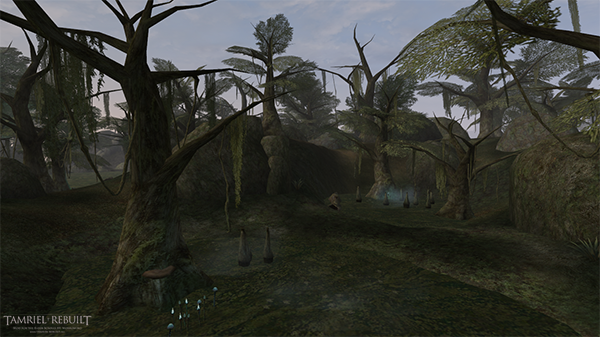
Swampy lowlands on the southern coast of the Inner Sea.
Stage: Released in Sacred East (2012), overhaul ongoing (exteriors).
Description: When the Tribunal came to power, the Indoril set out to transform Morrowind. Their reach extended to the far corners of the nation, and by and large they succeeded. The Indoril seat associated with House Mora, however, remained empty by tradition, filled in name by Indoril Nerevar, whose spirit could not rule it. So the region it commanded was left neglected where its neighbours flourished, an unacknowledged scar in the heart of Morrowind. What remained of the region eventually turned into a dangerous bog where packs of dangerous beasts prey on lost travelers.
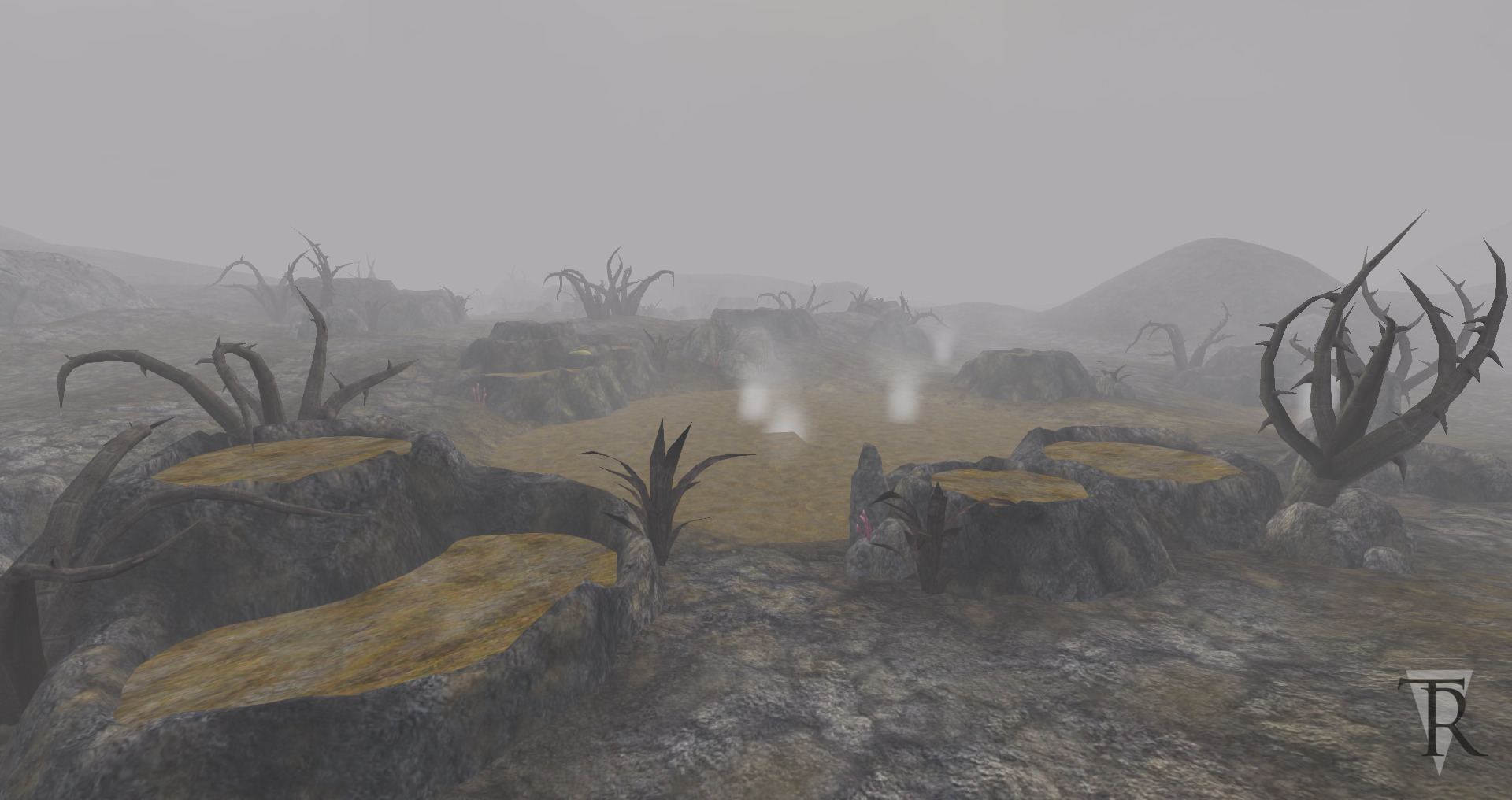
Sulphurous vapors belch from the ground in the revamped Sundered Scar.
Created largely as filler land in the earliest days of TR, the current Sundered Scar can be uncharitably described as a Bitter Coast clone, except flatter and with worse performance. A full overhaul of the region is currently ongoing, with exteriors well under construction, and will be released as a separate expansion. The region is being reimagined as a place where the Indoril terraforming failed; an ashy wasteland pocked by volcanoes and filled with sulphuric pools, geysers and various odd fungi and flora acclimatized to the harsh environment. Some Velothi settlements nevertheless eke out a living here, although largely neglected by its erstwhile Indoril masters, leaving the villagers to rely only on the kindness of the Temple.
Aanthirin

A view down a tributary of the Thirr River.
Stage: Released in Old Ebonheart (2018) and Aanthirin (2019), minor additions ongoing.
Description: Crossed by Veloth, who tamed its tumbling river, and rift by the creation of the Inner Sea, which shattered its mountains and linked the river to the Sea of Ghosts, Aanthirin has always had a central role in Morrowind’s history. So too now that its status as Morrowind’s crossroad has made it the focus of a bitter trade and territorial dispute between the dominant House Indoril and ascendant House Hlaalu. Divided between those houses, linked by Imperial trade interests and Temple authority, one thing is clear: although its river now flows gently and farms are abundant, Aanthirin itself has yet to be tamed. A Temple stronghold, Almas Thirr, sits in the middle of the region and regulates much of the province’s trade.
The TR team is quite happy with the current look of Aanthirin, especially following a round of terrain edits and the replacement of many vanilla assets by unique, region-specific ones in the 2022 release of Dominions of Dust. Some final asset replacements (e.g., unique rock textures), edits to Almas Thirr, and additional interiors and quests will still be added in the upcoming Hlan Oek expansion.
Velothis District
Bordering Indoril lands to the southeast, Hlaalu lands to the south, and Cyrodiil/Skyrim to the west, the mountainous Velothis District forms the northwestern arm of Morrowind, controlled by House Redoran. All exteriors in the Velothis District were finished over the course of 2009 to 2014 (superseding a very old, early 00’s version), as were a large proportion of interior claims, and the results are largely aesthetically pleasing. After some touch-ups, the southern part of the district was released as Dominions of Dust in 2022. However, as the questing department couldn’t manage to keep pace with exterior and interior progress in the central-to-northern Velothis, these lands have been neglected for a long time. By current quality standards, many of them will require substantial overhauls, once development effort is directed back towards the Velothis.
Armun Ashlands

The Velothi peaks rising above the Armun Ashlands.
Stage: Released in Dominions of Dust (2022), pending minor additions and fixes.
Description: The Armun Ashlands, is a great lowland dustbowl encircled by various mountain chains. Together with the post-overhaul Sundered Scar and, eventually, the northern-central Telvannis, it is one of the major regions on the mainland of Morrowind to sport ash, owing to active volcanic activity. An extremely dangerous region, it is home to the Ishanuran ashlanders, although the Hlaalu have been expanding their economic activity.
This region is among the nicest-looking that TR has released, but we do wish to add more unique assets to make it further distinct from the Vvardenfell ashlands. In addition, there remain stylistic issues with some of the interior locations present in the area, many of which date to the 00’s, that will eventually need to addressed.
Roth Roryn

The town of Menaan nestled in a Roth Roryn valley.
Stage: Partially released in Dominions of Dust (2022), pending fixes.
Description: Roth Roryn is a rocky, canyon region with plenty of hills that serves as the border between Redoran and Hlaalu lands. Largely beset by bandits, there are a few scattered settlements and farms, especially in the relatively lush nortern area where it touches the Inner Sea. The centerpiece of the region is Andothren, the largest Dunmer trade port on the Inner Sea and one of the major cities of the Hlaalu.
Although this area was quite recently released, there remain some issues with the region. Namely, the exteriors suffer from a 2010-ish proclivity to rely too heavily on rock meshes, rendering the region annoying to traverse and unpleasing to modern sensibilities. An exterior overhaul was initiated in 2021 to make better use of terrain and to give the player room to breathe; however, it was forced to pause prematurely in order to give our quest developers a stable base to work off of. Like in Armun Ashlands, many of the interiors, too, suffer from late-00’s stylistic issues and require overhaul. All of these fixes are currently planned for after Narsis District is finished.
Furthermore, the northwestern corner of the Roth Roryn will still be released together with the first Redoran-focused expansion.
Velothi Mountains

Looking north along the Velothi Mountains and across the famous Dwemer ruin of Hendor-Stardumz.
Stage: Partially released in Dominions of Dust (2022), pending minor additions.
Description: The towering Velothi Mountains form the border between Morrowind and Skyrim and are riddled with dangerous passes, only a few of which actually serve as passage between the two provinces.
The southern half of this region, released in 2022, benefited from a successful exterior overhaul that gave it a truly mountainous look. This overhaul still needs to be done on the northern, unreleased half, which will include Malahk-Bazul, a high valley on the intersection of three provinces home to a particularly aggressive subset of orcs. In addition, the region currently reuses many models and textures form vanilla Morrowind and its expansions; we plan to soon replace them with unique ones. Finally, as with the prior two regions, the Velothi Mountains requires fixes to its older interiors.
Clambering Moor
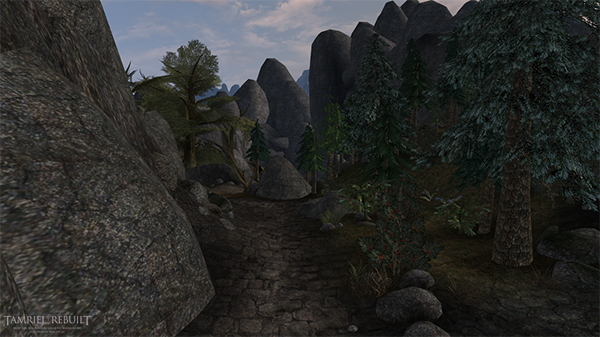
A mixture of plants in the Clambering Moor.
Stage: Asset development ongoing (old, unreleased exteriors included in TR_RestExterior.esp).
Description: A hilly region, the Clambering Moor is a unique mixture of the strange and familiar, both to Dunmer and Outlander eyes. Plants sprout in patches in between the rocky hills.

Clambering Moors concept by Squash.
This region, as it currently exists, is a retroactive designation given to a hodgepodge of exterior claims with few uniting characteristics. Although the current iteration of its exteriors were finished around 2011, they will have to be redone wholesale using new assets, some of which are already complete. In our new conception, the region will be a deep-red mountain grassland, accented by bleached tree trunks and ivory mushrooms, rolling down from the Velothi peaks to the Inner Sea coast. Once a center of power for the Dwemer, the Clambering Moor is now only sparsely settled by Redoran ranchers, often suffering orc raids.
Grey Meadows
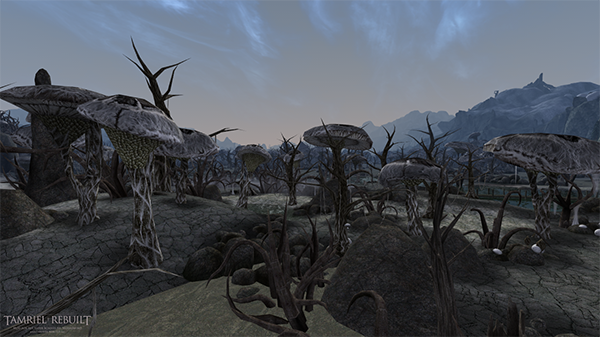
Mushrooms covered in ash dot the area.
Stage: Development pending, exteriors semi-complete (old, unreleased version included in TR_RestExterior.esp).
Description: An ash swamp, filled with mushrooms found nowhere else in Morrowind. Some waters run pure, others are fouled by ash, and everywhere there is quiet.
This was the first TR region to rely mostly on purpose-made assets and is still considered some of the best-looking exterior work in TR. Regardless, after a decade of tightening quality standards, this region, too, will require significant updates in terrain usage once its development restarts, although its general look will remain the same.
Julan-Shar

A logged area.
Stage: Development pending, exteriors semi-complete (old, unreleased version included in TR_RestExterior.esp).
Description: Redoran cities, including the house capital Baan Malur, dot the heavily forested landscape of Julan-Shar, where jagged rocks mix with coniferous trees to form a unique combination.
Although the region’s exteriors were also largely finalized in the early 2010s, these will need substantial updates in terms of unique assets and more.
Uld Vraech
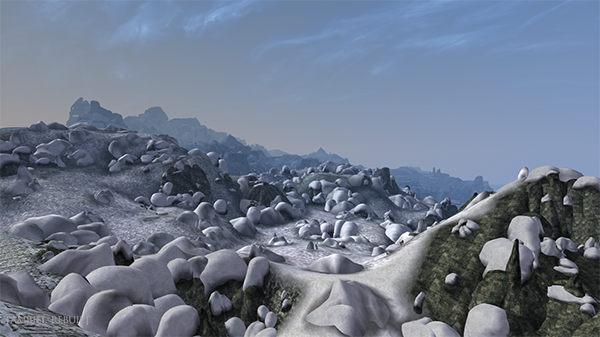
A freezing wind blows constantly in this icy region.
Stage: Development pending, exteriors semi-complete (old, unreleased version included in TR_RestExterior.esp).
Description: Uld Vraech is the snowiest part of Morrowind and is not recommended for the faint of heart. Snow blows constantly and dangerous creatures prowl the icy fields. Isolated Nord and Redoran villages nevertheless spar over the valleys of Uld Vraech.
As the only exterior region in northwestern Morrowind not to have been fully finalized and reviewed in the early 2010s, what is currently in TR_RestExterior.esp often suffers from landscape errors and degraded performance due to the lack of optimized assets. A substantial overhaul is, therefore, on the books, aimed also at making this region more distinct from the Velothi Mountains just to its south.
Narsis District
The southwestern quadrant of Morrowind’s mainland has a distinctive yellow-to-red hue. Once known as the Redoran Waters March with the Hlaalu confined to the cities of Narsis and Kragenmoor, the entire Narsis District is now the stronghold of House Hlaalu, who has heavily cultivated its lands. Aside from a long-discarded early-2000s iteration using vanilla assets, these landscapes are the newest ones being developed for TR, relying entirely on custom assets and adhering to our most recent standards.
Coronati Basin
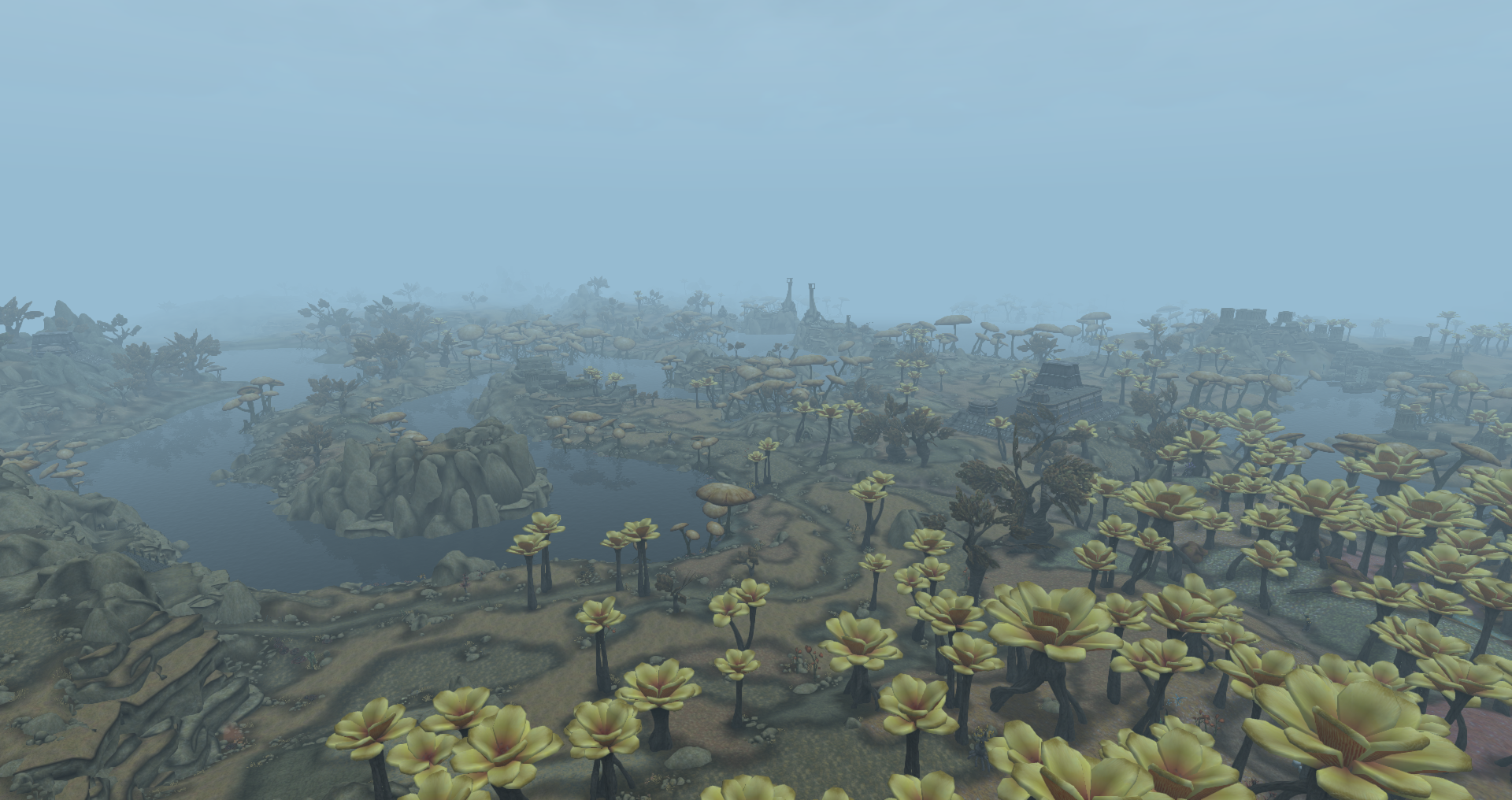
The Thirr River slowly meanders its way north.
Stage: Interior and NPC development ongoing, to be released in the upcoming Hlan Oek and Narsis expansions.
Description: The Coronati Basin surrounds its namesake lake and the upper-to-middle reaches of the great Thirr river. It forms a large valley surrounded by the high Deshaan plains to the east, the Shipal-Shin badlands to the south and the Kanit river valley to the west. Mushroom mangroves dominate the river banks and the landscape gradually shifts from the Aanthirin’s orange-green to Shipal-Shin’s red. Caught in politics and business, Hlaalu villages dot the landscape, and House Redoran has its furthest outposts here, keeping a wary eye on boat travel.
Most Coronati Basin exteriors have been completed, as have almost all interiors: the northernmost parts of this area are currently receiving NPCs and generic dialogue for the upcoming Hlan Oek expansion. Aside from NPCs and questing, some exterior work remains, such as completing the lake and river beds and touching up some of the earliest Coronati Basin landscapes that were made as our current standards were still being worked out.
Shipal-Shin
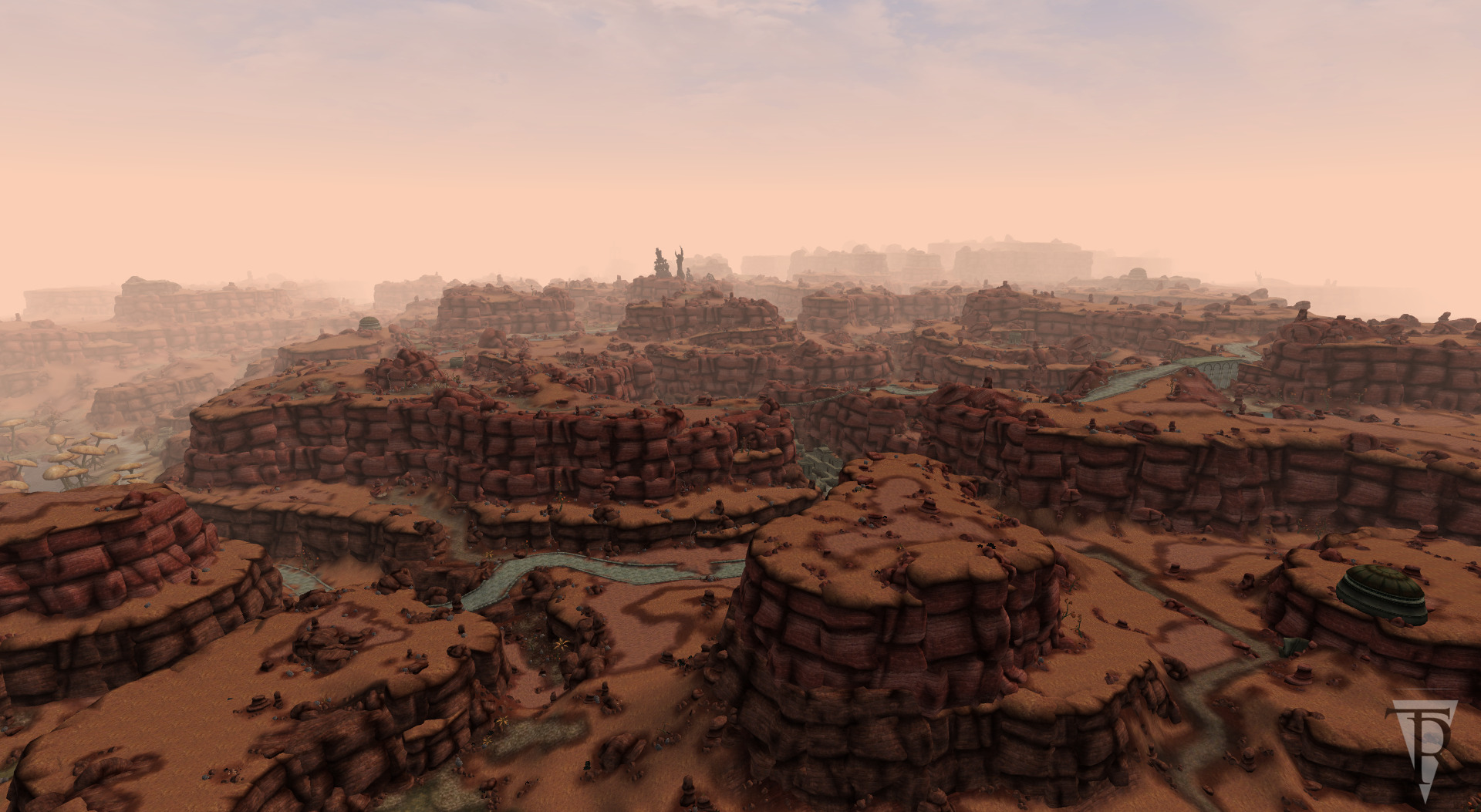
Deep canyons run between the mesas of Shipal-Shin.
Stage: Exterior and interior development ongoing, to be released in the upcoming Narsis, Saint Seryn and Kragenmoor expansions.
Description: The red canyons of Shipal-Shin rise up far to the south adjoining the Velothi Mountains, lowering their heights and forming a natural border both with Cyrodiil and Black Marsh. Aside from nomadic Shipal Clans, isolated Hlaalu settlements can be found in the canyons, with inhabitants tilling the red soil and tending the sparse foliage. The most prominent city of Shipal-Shin is Narsis, the capital of House Hlaalu, grown grand and decadent from the wealth gained by supplying the Empire’s failing Black Marsh settlements. Nearly all supplies destined for Stormhold pass through Narsis first and the Hlaalu are sure to take their pound of meat.
In active development since 2020, the areas to be released in the Narsis expansion are now exterior-complete. Interiors are busily being worked on, especially in the behemoth that is Narsis city, but some interior types are still waiting on asset work before development can begin. The western exteriors of Shipal-Shin, to be released with later expansions, remain in progress.
Othreleth Woods

The Othreleth Woods is one of the most colorful of Morrowind’s regions.
Stage: Exterior and interior development ongoing, small parts to be released in the upcoming Hlan Oek and Narsis expansions, the bulk in the later Saint Seryn and Kragenmoor expansions.
Description: The Othreleth Woods are the quintessential mushroom forest that inspired Morrowind’s depiction in the Pocket Guide to the Empire, 1st edition. These are also the true breadbasket of House Hlaalu. If the Aanthirin is spring and the Coronati Basin is summer, the Othreleth Woods are autumn. The sun seems to eternally set over great mushroom forests and the downpour of the Kanit River. Although dotted with Hlaalu farms and towns, built over the ruins of Redoran clansteads, deeper areas of the forest still remain dangerous locations.
Othreleth Woods exteriors entered production in 2022 and those slivers to be released with Hlan Oek and Narsis expansions are very close to exterior and interior completion. No exterior claim in the woods proper is yet complete, but a number are being worked on.
Deshaan District
The Holy Grail of TR, the southeastern Deshaan District is host to the only Great House that saw no depiction at all in vanilla TES: III. Following the scrapping of early 2000s work, Tamriel Rebuilt spent much of the mid-2010s coming up with unique designs for this region, but asset work has not yet progressed to the point where any implementation can begin.
Deshaan Plains

Concept art of Deshaan Plains by 10Kaziem.
Stage: Asset development ongoing, a small part to be potentially released with the Narsis expansion.
Description: The Deshaan Plains are flat, salty, and hostile. House Dres claims this territory as their homeland, from which they extend their influence east and north. The plains are riddled with crevasses and sinkoles and home to vicious skyrenders and xenophobic Dres. This region produces the majority of the saltrice consumed in Morrowind.
Many assets required for this region were gathered in the mid-2010s, but fail to meet our current quality requirements. Happily, a renewed push has recently seen many of the required environmental and architectural assets receive substantial progress. If enough assets can be finalized on time, there is hope to include a sliver of the region in the Narsis expansion, to provide a more pleasing eastern border to the Coronati Basin.
Salt Marsh

Concept art of Salt Marshes by 10Kaziem.
Stage: Brainstorming
Description: The southern edge of the Deshaan Plains descends into the Arnesian Jungle. The treacherous border between the two is known as the Salt Marsh, which is home to the salt animals of the Deshaan as well as the jungle creatures of the Black Marsh. This borderland is as dangerous as the regions on either side.
Mudflats
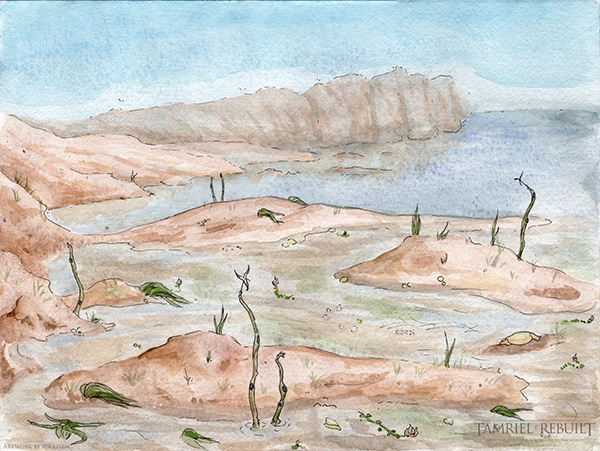
Concept art of Deshaan Mudflats by 10Kaziem.
Stage: Brainstorming
Description: The Mudflats (placeholder name), in reality the southern terminus of the great eastern mudflats of Morrowind, are where the salty Deshaan Plains crumble into the sea. The local plants and animals are well-adapted to tidal changes in the landscape and the shifting mud and sandbars. This is also where the great trade port of Tear is situated – one of the few places where the Dres tolerate the presence of outlanders.
Arnesian Jungle

Concept art of southern Deshaan Plains overlooking the Arnesian Jungle by 10Kaziem.
Stage: Brainstorming
Description: The Arnesian Jungle is the shifting, deceptive northern reaches of Black Marsh. Thirty years ago, the Arnesian War resulted in the addition of this territory to the lands of House Dres. The visuals of the region are still in the early brainstorming stage.








2018-04-17 00:38
5 months 5 days ago
All I hope that Molagreahd won't be like bright WoW online district. And Clambering Moor won't be too big of a red color palette
2019-08-25 19:28
15 hours 49 min ago
The regions will of course retain the desaturated look of Morrowind; some of these concept pieces are just exagerrating the colors.
2016-01-25 21:01
10 hours 21 min ago
Missing Scath Anud region
2019-08-25 19:28
15 hours 49 min ago
Is that already in TR_mainland? Or just conceptualized to be added later?
2016-01-25 21:01
10 hours 21 min ago
Conceptualized as much as amber forest is I suppose
2019-08-25 19:28
15 hours 49 min ago
Hmm, sure, I can add a mention about Scath Anud under the Boethiah's Spine section.
2020-03-22 23:41
1 week 15 hours ago
I'm so glad this is finally getting done! A small comments, might add more later if I find time to read the full draft: Sea of Ghosts should be marked as "Partially released", just as Velothi Mountains. And to be fair, Roth Roryn is pending additions as well with the Kartur expansion. Maybe you should also mention that a small portion of Alt Orethan was released with the Sacred East.
2019-08-25 19:28
15 hours 49 min ago
Thanks! Fixed this and Cicero's comment above. I think I'll replace the current page with this one now, since release is imminent. You can still send me comments by PM and I'll fix them.